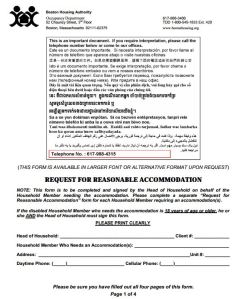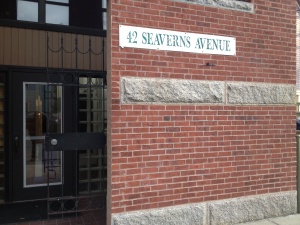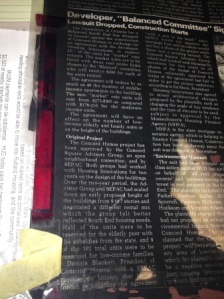BY JORDAN FRIAS
POSTED ON JANUARY 31, 2013
Trying to find housing in Boston is hard enough. Imagine trying to find housing for you and your spouse when you are both low-income, disabled and have “CORIs” (Criminal Offender Record Information) against you.
Erica Tanen, peer disability advocate for Boston Center for Independent Living, is currently working with a couple, or consumer, to secure housing for them, but the process has not be easy. A major issue has been dealing with owners who have denied applicants based on their section 8 vouchers which pays for about 70 percent of the person’s housing costs.
“It’s illegal for anyone to deny an applicant because of a section 8 voucher,” Tanen said. Still, owners have told some of her consumers that they do not accept these vouchers, which is obviously not the case. Tanen then has to tell her consumers that the owner is misinformed. The next step is advocacy. At times the consumer will call the home-owner themselves, other times Tanen confronts the owner for her consumer via telephone.
“It’s awkward for me,” Tanen said. Owners usually tell her that they will not accept her consumers because they have had low-income section 8 voucher owners as tenants before which, “hasn’t worked out so well.”
Tanen’s job is to then refer her consumers to a lawyer in the community. One popular choice is Greater Boston Legal Services which provides lawyers to these low-income applicants to fight discriminatory affordable housing owners.
While this process is going on, these applicants must renew their section 8 vouchers which expire every 60 days, depending on where they got their voucher, what type of voucher it is, along with some other factors. Their disability helps approve them for these renewals, Tanen said.
Consumers who resource Boston Housing Authority for housing are usually placed on an eight year waiting list on average. If they are homeless at the time then their waiting time is reduced to about five years. These consumers can either apply to be on another list for public housing or private subsidized housing (check out list of available private subsidies here or on the HUD website here). The benefit of applying for public housing is that there is one single application that can be used to apply to almost all 242 different housing authorities (see list of public housing here or on the Metropolitan Boston Housing Authority page here).

Snapshot of public housing application with reasonable accommodation request through Boston Housing Authority
With the rise in affordable housing units across the city, consumers of Boston Center for Independent Living are applying to live in newer buildings which can sometimes be easier to get in to depending on the owner, according to Tanen. Tanen says that consumers who apply to private subsidized buildings in addition to public housing tend to get housing quicker than those who only apply to public housing as well.
There are other obstacles that stand in the way of her consumers getting housing. If they are married during the waiting process then their spouse cannot live with them because they originally asked to be housed as a single person. They can also lose their housing easily if they allow someone to stay over their apartment during the night.
These strict factors make it hard for some to gain or maintain their affordable housing units. Tanen said that there is also a “pre-waiting list” for individuals who apply for section 8 vouchers which are “really hard to get.”
While these consumers are playing the waiting game essentially, they are competing with many others who wish to occupy affordable housing in the city. Agencies like Boston Center for Independent Living will strive to streamline the process for those who are unsure of their options.


